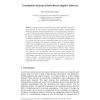Free Online Productivity Tools
i2Speak
i2Symbol
i2OCR
iTex2Img
iWeb2Print
iWeb2Shot
i2Type
iPdf2Split
iPdf2Merge
i2Bopomofo
i2Arabic
i2Style
i2Image
i2PDF
iLatex2Rtf
Sci2ools
114
click to vote
COORDINATION
2005
Springer
2005
Springer
Coordination Systems in Role-Based Adaptive Software
Software systems are becoming more open, distributed, pervasive, and connected. In such systems, the relationships between loosely-coupled application elements become non-deterministic. Coordination can be viewed as a way of making such loosely coupled systems more adaptable. In this paper we show how coordination-systems, which are analogous to nervous systems, can be defined independently from the functional systems they regulate. Such coordination systems are a network of organisers and contracts. We show how the contracts that make up the coordination-system can be used to monitor, regulate and configure the interactions between clusters of software entities called roles. Management and functional levels of contracts are defined. Management contracts regulate the flow of control through the roles. Functional contracts allow the specification of performance conditions. These contracts bind clusters of roles into self-managed composites — each composite with its own organiser role....
Related Content
| Added | 29 Jun 2010 |
| Updated | 29 Jun 2010 |
| Type | Conference |
| Year | 2005 |
| Where | COORDINATION |
| Authors | Alan W. Colman, Jun Han |
Comments (0)

